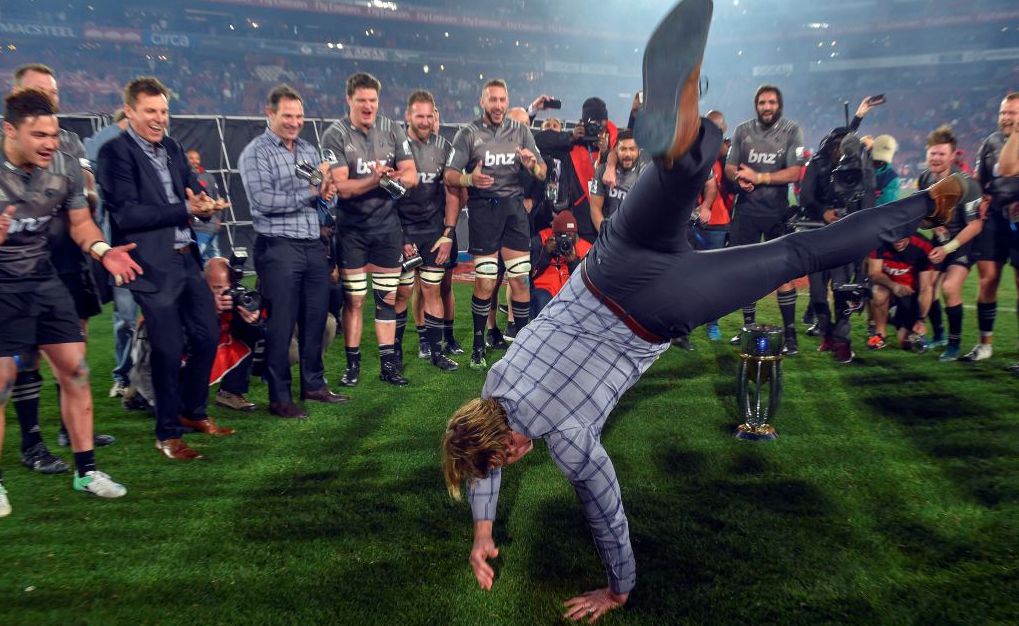In his first column for SA Rugby magazine, former Springbok captain JEAN DE VILLIERS highlights how South African rugby can take a lesson from the Crusaders’ hugely successful structures.
The Crusaders won the Vodacom Super Rugby tournament in 2017 and 2018, and having dominated the conference phase of this year’s competition, they are favourites to claim a third successive title.
How do they do it? I’ve asked myself this question regularly over the past three seasons.
It’s hard to believe this franchise went nine years without a trophy between 2009 and 2016. Some great All Blacks featured for the Crusaders during that period – Richie McCaw and Dan Carter chief among them – but for some reason the side was unable to go all the way.
Players from this franchise dominated the All Blacks squad at the 2011 and 2015 World Cups. Much has changed over the past three seasons, though. While the Crusaders still boast some world-class players such as Kieran Read and Sam Whitelock, only five or so look set to feature at the next global tournament in Japan. How is the current Crusaders team succeeding, then, where the star-studded side of the past era failed?
I caught up with Crusaders assistant coach Ronan O’Gara when the team was in Cape Town to play the Stormers in May. I asked him how a team with relatively few All Blacks squad regulars has managed to set a high standard over the past three years. O’Gara – who I played alongside at Munster – credited the thriving culture at the franchise and the man at the helm, Scott Robertson.
Perhaps a few people underestimated Robertson when he got the head coach job in 2017. He’s not your typical coach in terms of demeanour and approach. He does things differently, as seen by his breakdancing celebrations in the wake of each title triumph.
Robertson has encouraged the coaches and players to express themselves. The Crusaders have become a bit like Saracens in the sense that their culture underscores everything they do. The support for the players off the pitch shapes the performances of the team on every game day.
O’Gara worked with Racing 92 in France before joining the Crusaders coaching staff last year. He too has benefited from working with a head coach who encourages his assistants to find solutions and stay at the cutting edge of the game.
Neil Powell is another example of a coach who has reaped the rewards of a strong team culture. The Springbok Sevens squad is like a family. We’ve seen the players fighting for each other and claiming some big wins – even on the occasions when their star performers have been missing.
Every team has to deal with injury setbacks. The Crusaders have had more than their fair share this season. They’ve also had to comply with New Zealand Rugby’s policy of resting All Blacks at certain stages of the tournament – given it is a World Cup year. What we’ve seen, however, is the fringe players slotting straight into the Crusaders team and making an immediate impact.
That’s the kind of environment every franchise and club should aspire to. Those youngsters and fringe players are the future of the Crusaders, and by all accounts that future looks bright.
Again, the credit needs to go to the coaches as well as the support structures at the club. Everybody is pulling in the same direction. The chances of success are improved, of course, when you have a system in New Zealand that encourages the mentoring of up-and-coming coaches.
There’s a lesson to be taken from the Crusaders’ success behind the scenes. South Africans are quick to judge a local coach when he doesn’t get results. What needs to be asked, however, is whether that coach is getting all the support he needs to build a thriving culture and ultimately a team that can win trophies.
The two, as we’ve seen with teams like the Crusaders, Saracens and the Blitzboks, go hand-in-hand.
*De Villiers is a former Bok captain and World Cup winner, who earned 109 Test caps. He now serves as the Head of Philanthropy at Citadel:
Photo: Christiaan Kotze/AFP/Getty Images






